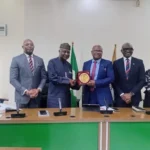By Rukayat Moisemhe
The Bank of Industry (BoI) and financial experts have urged Micro, Small and Medium Enterprises (MSMEs) to embed Environmental, Social and Governance (ESG) principles in their operations to engender growth and global competitiveness.
They gave the advice on Tuesday in Lagos at the BOI inaugural ESG Conference and Launch of the ESG Adoption by Nigerian MSMEs report.
The theme of the conference was: “Advancing Resilient and Responsible Enterprises: ESG as a Strategic Imperative for Nigerian SMEs”.
The Managing Director, BOI, Dr Olasupo Olusi, noted that the global economy was shifting toward one that rewarded responsibility, transparency, and sustainability.
Olusi stressed that Nigerian businesses, particularly MSMEs, must be equipped to compete and prosper in the new landscape since they account for over 90 per cent of businesses.
“MSMEs account for over 90 per cent of Nigerian businesses, contribute nearly half of Gross Domestic Product (GDP) and employ millions of Nigerians.
“Yet, many still face barriers in understanding what ESG means in practice, how to embed these principles in their daily operations, and how doing so can make them more bankable, competitive, and future-ready.
“This conference aims to bridge that knowledge gap by providing a practical platform where policymakers, financiers, business owners, investors, and sustainability experts can share insights, exchange experiences, and co-create
solutions,” he said.
Olusi said, the bank, as Nigeria’s foremost Development Finance Institution, stood at the intersection of finance and development, with its mandate going beyond lending.
He noted that recent years, the bank had seen encouraging momentum across the MSMEs landscape with a growing number of enterprises exploring renewable energy solutions, reducing waste and improving labour and governance practices.
He, however, stated that there remained significant opportunities to scale ESG adoption.
Mrs Tenioye Majekodunmi, the Director-General, National Council Climate Change, noted that in a changing world, ESG pathways for Nigerian SMEs could not be more timely and more urgent.
Majekodunmi said the country was at a defining moment, where environmental responsibility, social inclusion and good governance were no longer optional ideals, but strategic imperatives for growth and survival.
She said the transition to a low-carbon future was underway and would affect how businesses compete, build resilience and attract finance.
Majekodunmi noted that the transition presented both risks and opportunities for Nigerian MSMEs, that account for over 80 per cent of employment and nearly 50 per cent of GDP.
“Those that adapt early by embedding ESG principles into their operations will not just survive, but they will thrive in a changing world.
“Let me commend the Bank of Industry for its leadership in advancing sustainability through its recently launched Sustainability Finance Framework.
“Nigerian MSMEs that positioned themselves early by adopting sustainable reporting, efficient resource use, and gender inclusion, as well as responsible governance, will be the preferred partners for global trade and finance,” she said.
Majekodunmi said the experts shared goal was clear, to make sustainability a competitive advantage for Nigerian enterprises and not just a compliance requirement.
She stressed that Nigeria must not only participate in the global ESG revolution, but must lead it on its own terms and in line with its development priorities.
Mr Mahamadou Diarra, the Deputy Country Director, Agence Francaise de Developpement Nigeria (AFD), commended BOI for its strong commitment and ongoing efforts in advancing ESG practices.
Diarra stated that the agency paid close attention to the potential environmental and social impact of its funded projects.
He said one of its key responsibilities as a development institution was to ensure that the financial institutions they support applied the same level of environmental and social diligence the agency showed.
Diarra stated that the AFD would continue to provide technical guidance and assistance to support partner institutions in designing and strengthening environmental and social management systems.
“Such systems aim to prevent, mitigate or compensate for adverse impacts of financed projects, while also improving the partner institutions’ overall practices,” he said.(NAN)(www.nannews.ng)
Edited by Chinyere Joel-Nwokeoma











